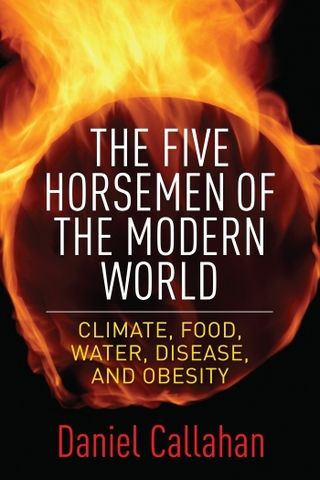By Daniel Callahan, Ph.D.
High among global health problems is that of obesity. Hardly any country, save for the poorest, has escaped it. The United States is the world’s leader, with 67 percent of the population overweight and 35 percent obese. In my own research on it and four other global environmental and health crises (global warming, food and water shortages, and chronic illness)—all of them getting worse not better—I have found obesity to be the most perplexing. And psychologically it is the most interesting and aggravating.
The perplexity comes from two sources. One of them is the role of genetics in causing or worsening obesity, with a general agreement that it accounts for about 60 to 65 percent of the problem. A few other medical causes have been singled out, but none, frustratingly, has offered a solid pathway to treatment. The other perplexity is where psychology comes in. Social scientists coined the term “obesogenic” to characterize a leading feature of modern societies: too little physical activity combined with two little exercise, as well as cheap food and sugary beverages that too easily add calories. How can obesogenicity be curbed? A major obstacle is that few countries, especially the U.S., are willing to tolerate a strong role for government in controlling what we do with, or put in, our bodies. Neither taxing unhealthy foods nor restricting their availability has public support–a resistance aided and abetted by powerful industries that sell them.
In sum, after at least 40 years of effort to control obesity—between a failure to find an effective medical cure and a socially acceptable public policy against it—the obesity rate continues to rise. Here I will enter my own story.
In the 1960s, an organized campaign began to reduce smoking. It relied heavily on education about its dangers, taxing tobacco products, regulating advertising, and limiting where people could smoke. And, if not a formal policy, shaming and stigmatizing those who smoked was rampant. Those tactics have worked, not fully (some 18 percent of people continue to smoke), but still well enough to call the campaign a success. While many of the antismoking strategies based on education have been tried with obesity the one that attracted me had not: stigmatizing the obese. Stigma had worked with me personally and many others to stop smoking, yet it has been vehemently rejected for obesity by psychologists and public health experts.
The evidence offered by obesity experts seemed, on the face of it, initially overwhelming to me. Could hundreds of studies and expert consensus be wrong? The evidence does indeed show that the obese feel stigmatized. But the evidence is heavily based on self-reporting, which is considered soft data. Out of curiosity, I decided it would be interesting to do a Google search on stigma to see which other groups believe they are stigmatized. It turns out to be a long list (try it yourself), and I gave up after reaching over 30 such groups (many with organizations set up to reduce stigma against them). Diseases, both physical and psychiatric, lead the list. But the list also includes old age, several racial and ethnic groups, short height, atheism, and assorted other categories. I qualify as stigmatized on four lists: short height (5’7), age (85), atheism, and being white. If I am stigmatized, I have not noticed it. President Taft and Queen Victoria were notably beloved as well as notably obese. Governor Christie of New Jersey got elected despite his heavy weight. When it is said then the obese are stigmatized, does that mean each and every one of them? That is rarely made clear in the research.
While I have some skepticism about whether obesity carries much of a stigma, I am sure that some obese people feel stigmatized, just as the idea of an obesogenic society is well established. But that leaves two dilemmas. The first bears on how we publicly discuss obesity. It is a major health threat, and that needs to be said clearly and forcibly. Prevention is the key to a healthier future. Those not yet obese—but noting a rise in their weight–need to make changes in their eating and exercise habits to avoid obesity, which they should fear. Yet it seems difficult if not impossible to talk about the danger of obesity at all without seeming to inadvertently stigmatize those already obese. I see no way of avoiding that hazard; obesity is harmful, avoid it.
The other dilemma is created by the same public health community that believes the obesogenic nature of society is the cause of obesity. It is the fault of society, not the personal failure of the obese. But that community also says that people should make “heathy choices” in what they eat and engage in regular exercise—both of which assume we do indeed have some freedom of choice. Those recommendations contradict the idea that we have no free choice. That said, it needs to be noted that, once obese, a person has no more than a 5 percent to 10 percent of keeping weight lost by dieting. Obese people have in that sense lost their free choice. Prevention is thus critical.
At the core of my interest in obesity and four other intractable global problems—the five horsemen, as I called them in my book—was my desire to understand why all are getting worse, not better, despite massive efforts to cope with them. At least with the other horsemen one can find some hopeful signs that maybe, just maybe, significant progress may someday actually happen. Global warming, perhaps the greatest threat, has managed to stimulate some important international agreements, a real breakthrough. Global food and water shortages can surely become deadly, but will affect some of us much more than others.
But obesity stands out for its capacity to evoke a kind of personal indignation and fear that I have not felt in my research on and discussion about the other horsemen. Many of the obese, even if not all, suffer, physically and emotionally. But I also found that threats to our bodies scare people more than threats to our environment, even if the latter may eventually do us in. I have conducted no poll, but I would bet that more people see Alzheimer’s disease as a greater terror in their lives than deadly droughts and rising ocean levels. Yet, for all the worries about weight and fear of stigma, obesity has not scared the public enough to lead them to accept the government regulations that could work to stem its steady increase.

Daniel Callahan, Ph.D., is the cofounder and president emeritus of The Hastings Center, and a senior scholar at Yale, where he researches ethics and health politics. He is the author of 41 books, including his most recent, The Five Horsemen of the Modern World: Climate, Food, Water, Disease, and Obesity, Columbia University Press.





